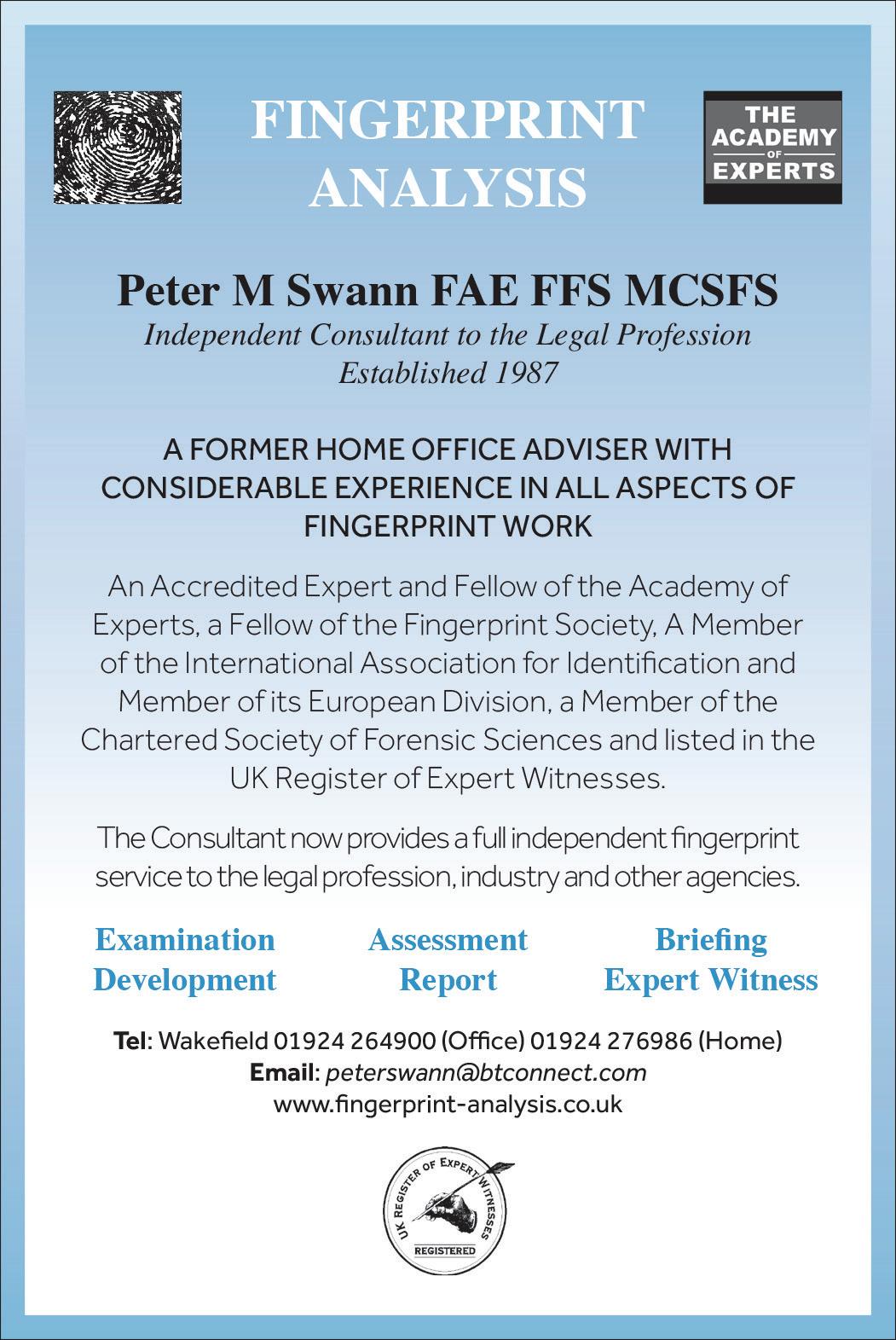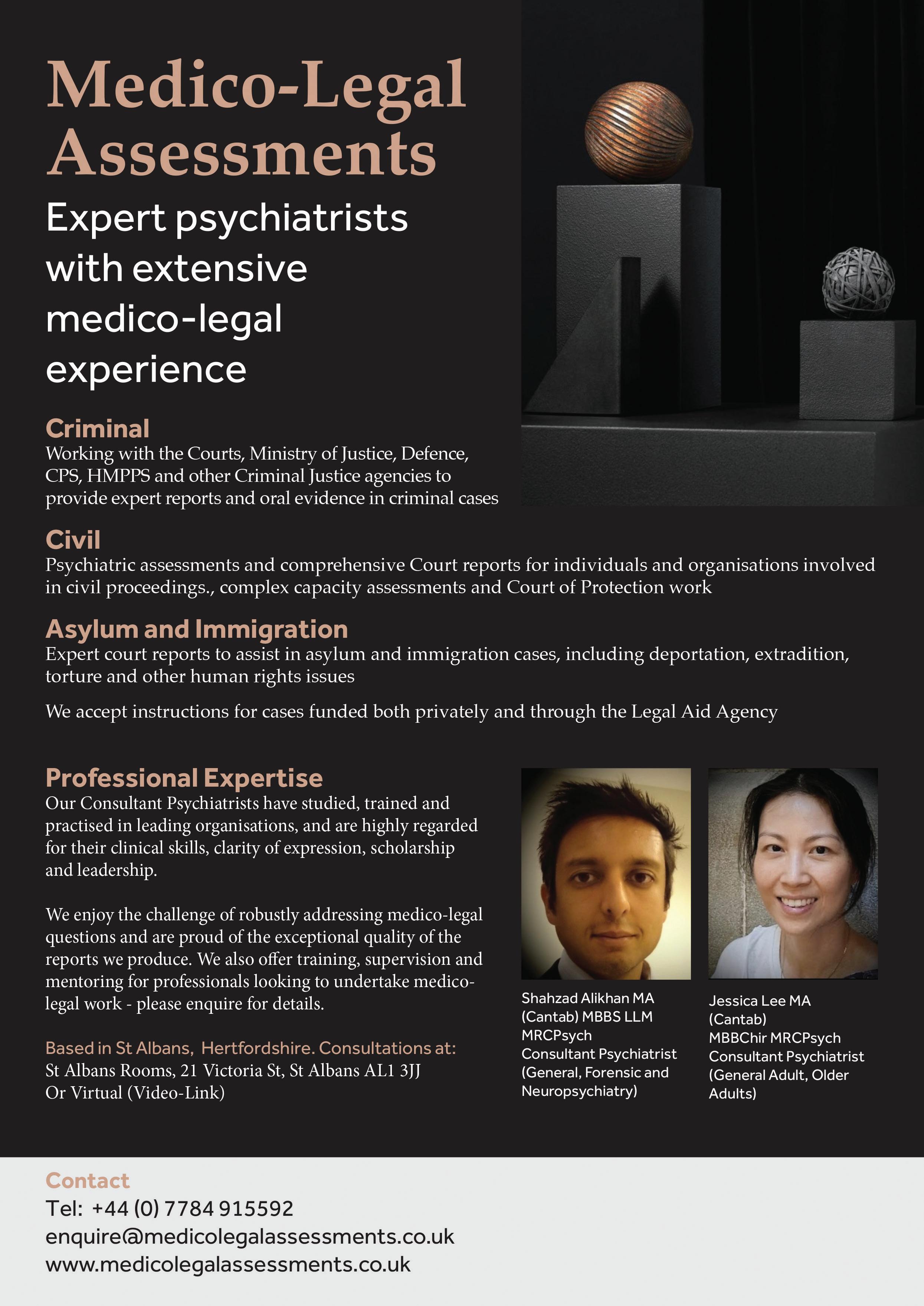






President Massimo Trebar of Lawtons (Criminal Lawyer)
Vice President
Michael Scutt
Crane & Staples, Employment and Dispute Resolution
Hon Secretary and Treasurer
Judith Gower
Immediate Past President
Kirsty Richards of National Legal Service (Family Lawyer)
Members
Steve Hamilton
Taylor Walton LLP (Harpenden)
Private Client
Marilyn Bell SA Law (St Albans) Family
Paul Davies
Hamilton Davies (Stevenage) Employment, Family and Litigation
Claire Sharp
Debenhams Ottaway (St Albans)
Private Client
Penny Carey (University of Hertfordshire)
Neil Johnson Gisby Harrison
Suna Duzgan Fish & Co
Alexander McDowall
Hertfordshire County Council
Nicola Smyrl of Taylor Walton (Luton and an Employment Lawyer)
(From January 2025 until 31 December 2025)
Laura Woolard of Taylor Walton (St Albans and a Family Lawyer)
Amanda Thurston University of Hertfordshire
Jane-Louise Burrows Fullers Family law
Amy Hodgson Nockolds
National Council Member
Josephine Duchenne
National Council Member for Hertfordshire and Bedfordshire (from 15th October 2021)


It’s a huge honour and responsibility to be nominated as president for this year, not something I was ever expecting.
I would firstly like to thank Kirsty Richards for her fantastic work last year, culminating in a brilliant annual dinner; but throughout the year her untiring commitment to legal aid issues; access to justice; and promoting Herts Law Society across a wider network, and achieving growth in membership. I want to maintain her focus on these core issues of maintaining membership, expanding our social media presence, and maintaining the educative resource that our local Law Society can provide.
Also thanks to Michael Scutt who has accepted my offer for him to support me in my presidency as Vice President for 2025. We both have specific local links in the Hertfordshire area, and also a shared interest in running!
And thank you also to Judith Gower, as Honorary Secretary and Treasurer for me in 2025. I am already hugely in her debt in respect of all of the work she has already done in the short period that I have been President and will be very grateful for her ongoing support.
The annual dinner is now booked for Friday 6th June 2025; at Hatfield House. We have obtained the attendance of Richard Atkinson, president of the national Law Society, as keynote speaker. I'm in the process of obtaining sponsorship for the event and have a number of leads that I am pursuing.
By way of introduction, I'm a senior
solicitor and partner at Lawtons solicitors, based in Saint Albans Hertfordshire. I have been involved exclusively in criminal defence since starting as a paralegal in 2000 (which is astonishingly now 25 years ago!). I've worked in a number of firms both in central London and Greater London areas, joining Lawtons in 2016. I have always maintained a commitment to and interesting legal aid representation. I continue to be on duty solicitor rotas both for court and police station. I have been a keen follower in the tumultuous and eventful ‘long winding road’ of Legal aid criminal defence developments, From the introduction of means testing in 2005, imposition of police station fixed fees in 2008, and the narrowly averted potential catastrophe of competitive tendering almost imposed by the Conservative Liberal Democrat coalition in 2015. This would have resulted in the devastation of the criminal legal aid supplier base. It was not proceeded with by the government ultimately because of a judicial review involving hundreds of firms, who were simultaneously either suing the government to abolish the scheme; or suing the government if the scheme was abolished for the loss of the contract!
Lawtons have navigated and survived these difficult times; where many other criminal defence legal aid providers have failed. There are a number in the
Hertfordshire area who have gone out of business. The total number of duty solicitors on duty rotas has fallen significantly since 2010. The age of the average duty solicitor is now over 50; and there are less and less young duty solicitors coming through the system. Lawton's have always had a commitment to training young solicitors. At this time we currently have a number of trainees and also solicitor apprentice; and we have successfully taken on own newly qualified solicitors.
I have an interest in solicitor qualification; and I'm particularly interested in the roll out of SQE, now replacing the LPC (which is in its final year). I am seeking to arrange with the university of Hertfordshire, a round table event, to include if possible attendance by the SRA, and Amanda Thurston has been assisting me with this.
On November the 22nd I attended the Bucks, Berks and Oxfordshire Annual Dinner and awards, on behalf of Hertfordshire. The theme was a masked ball and ‘Bollywood’ event. It was a wonderful evening, and refreshingly informal.
Of course I danced with the belly dancer, but tragically there are no photos of me dancing. (Continues over page.)

16th January 2025, I attended and in person SAALS meeting In Winchester. This was a particularly interesting event with a number of very important issues dealt with. I am aware that there will be a separate report prepared in relation to this meeting; however I can summarise the salient points as follows.
• Repercussions of the Axiom Ince scandal
• SRA consultation on the issue of client accounts
• bicentenary of Law Society
Of immediate concern to all practitioners
is the issue raised of a consultation to look into whether solicitors should continue to hold client account money or whether this important function should be controlled by ‘third party managed accounts’. A response to the consultation is due by the 21st of February 2025, and it was suggested that each individual law Society should prepare its own response, but that it may be beneficial if these could be shared between law societies to coordinate the response. The proposal was roundly condemned on all sides at the SAALS meeting; in which it was considered the such a move would
As a distinguished cat I have to keep warm. I don’t like being cold, luckily my hooman father (HF) doesn’t like the cold either so he often turns the fire on. If the fire is not on I hide under a table next to the radiator. I wish they would put a nice rug in front of the fire for me but no such luck yet, something about a tripping hazard. I always sleep on their bed to keep warm.
I was taken to the vet the other day for my vaccinations, annual checkup and they cut my nails. Didn’t even give me a manicure and pedicure – the insult. The vet did say that I was like a 4 year old cat and not a 7 year old one, my weight is the same as last year and also my teeth are perfect. I do like to take good care of myself. I sulked for a full 24 hours with my HF as he was the one who took me. I came round quickly when he had a shingles vaccination which made him feel bad!!
I think they might be going away for my hooman mother’s birthday as I keep being told I will see Lexi who is my favourite person in the whole world. I will still sulk when they get back.
Until next time @princessgigi2019

require a significant change in practise not ever envisioned by the SRA. It would have profound implications for all areas of law but of course particularly conveyancing and private practise.
Looking forward, I'm hoping to engage with everyone on the committee in extending all aspects of the positive work that the Hertfordshire Law Society provides.
Massimo Trebar Lawtons
President, Hertfordshire Law Society




At some point during our legal working lives, we will be asked to write a blog/article.
Why is it that, despite how many emails you send on a daily basis and applications or briefs you draft, the thought of putting pen to paper for a short article to be shared causes instant writer’s block!
But why is writing an article or blog so difficult? Everyone will have their reasons, but with 77% of internet users reading blogs on a regular basis (according to UK Web Host Review) and there being no doubt that during your legal career, at some point, you will have to write an article to summarise a case or use as a publication for your firm’s socials, then it really is a good time to ensure that you are brushed up on your article writing skills.
Here are some top tips to get you started!
1. Think about your audience
“A good writer possesses not only his own spirit but also the spirit of his friends.”
Friedrich Nietzsche
Before you start thinking about what to
write about (see point 2 below), you should give some thought as to who your audience will be. This will be easier if you are being asked to write an article for a specific reason.
Knowing who will be reading your article will help you tailor what you want to write about. This will help you write to someone rather than at someone.
2. Topic
“To produce a mighty book, you must choose a mighty theme.”
Herman Melville
Once you have given thought to who your audience is, the next step is to brainstorm what your article will be about. This can be difficult. Going forward, you might find it useful to keep a notebook or Word document near by so that if you ever think of a good article topic, you can take note for the future.
To assist in deciding on your chosen topic, you might want to have an eye to current affairs or an upcoming event or celebration to relate your article to. For example, throughout the year, there are many ‘awareness’ dates. International Women’s Day, LGBT History Month, World Cancer Day, Mental Health Awareness Week and Black History Month are just a few examples.
A list of upcoming awareness days can be found here: https://www.storytagger.com/ resources/calendar-of-awareness-days-tosupport-at-work/
3. Presentation
“If you don’t know what you want to achieve in your presentation your audience never will.” - Harvey Diamond
Remember that you need to convince your audience to read your article. It is important that your article sets out information in an easy-to-follow format.
Use new paragraphs where necessary and, where possible, use lists or bullet points. This will keep your reader more engaged.
Do not forget the importance of headings and sub-headings, particularly if you are drafting a lengthy case summary or judgment. This will allow readers to navigate the document with ease.
4. Language
“The most valuable of all talents is that of never using two words when one will do.”
Thomas Jefferson
Do not use long sentences and remember to use punctation.
Finally, remember to not use any legal jargon. Sometimes, owing to the nature of the work we do, this is unavoidable, in which case make sure you clearly explain what the legal word means, remembering your audience and who you are explaining this to!
Jessica Few Longmores

1 in 6 workers are dealing with a mental health problem such as anxiety, depression or stress.
The World Health Organisation defines good mental health as “A state of wellbeing in which every individual realises his or her own potential, can cope with the normal stresses of life, can work productively and fruitfully and is able to make a contribution to her or his community.” However, the reality is that at some point in every individual’s life, we will experience bad mental health and may even “burn out” – but what does this mean?
There are a vast number of symptoms which can include exhaustion, irritability, anxiety, you may have trouble sleeping and you may experience headaches. What can we do to cope with burnout?
• Take your annual leave – it is there for a reason, giving you an opportunity to recharge
• Make sure you are getting enough rest – it is recommended that adults should be getting at least 7 hours sleep
• Schedule in leisure activities – whether this be time in the gym, spending time with friends and family or watching your favourite series on Netflix
• Ask for help – talk to your supervisor and your colleagues at work – chances are they’ve experienced this before!

Mind in Mid Herts is an independent charity, affiliated with National Mind. They provide prevention, recovery and support services in Hertfordshire to empower people aged 16 and over to take control of their mental health.
Mind in Mid Herts supported nearly 2000 people last year –which an increase of 60% since 2019.
The Hertfordshire Junior Lawyers Division (HJLD) have been supporting Mind in Mid Herts since September. On 21 November, we hosted our Christmas Event at Mill Green Golf Club. During our event, we were delighted to hear from Sana Ahmed, who is Head of Services at Mind in Mid Herts. Sana gave us an insight into
the charity’s work and the impact that our fundraising will have. From ticket sales and the evening tombola, the Committee raised an incredible £446 for the charity and we would like to extend our gratitude to the many local firms who attended that evening.
On 30 November myself, Amy, Kiera, Amelia and Aeden ran the Mental Elf Festive Run for Mind in Mid Herts. It was a lovely morning, fuelled with festive fun with a live band, choir and a Christmas market. We managed to exceed our fundraising target by 328%, raising an outstanding £660 for the charity.
The Committee cannot wait for our events taking place in 2025 – watch this space!
Juliette
Fletcher, Crane & Staples

http://www.hertslawsoc.org.uk/

Having qualified into Commercial Litigation in September 2023, I have recently been required to put a lot of thought into the question of which area of law to qualify into. This article aims to help junior lawyers tackle this question and some provides considerations to take into account when making the decision.
1. As a starting point, focus your mind by asking the following questions:
• Do I prefer contentious or noncontentious work?
• Do I prefer working for individuals or companies/entities?
• Do I prefer to follow the phases of a transaction or to comply with court deadlines?
The answers to these questions will likely rule out a number of departments immediately.
2. Discuss the decision with those around you.
This can be a difficult decision to make, so do not be afraid to talk it through with others. This should include colleagues in a variety of different departments, who can share their experiences with you. Also, ensure that you discuss the question with family and friends who are likely to know and understand your personality on a deeper level and may be able to give an alternative perspective.
3. Think about the long game. It is important to pick a department, that you will enjoy not just in one year’s time but in 30 years’ time. Whilst it can be possible to swap speciality within your career, it will be more straightforward to pick a department that you enjoy and want to stick with. This means focusing your mind to think about the type of work that you enjoy the most.
It can be easy to let other individuals influence your decision. You may think about qualifying into a department because you enjoy working with certain colleagues or supervisors, however there are no guarantees as to who you may work with in the future and therefore this shouldn’t be a deciding factor.
Further, try not to let the choices of others influence your decision. For example, if another trainee in your cohort prefers the same department as you, this should not stop you from pursuing the same.
4. Pros and cons list.
There is a lot to be said for physically writing two lists of the advantages and disadvantages of each department. Incorporate a variety of factors into this process, including the level of client interaction, the level of work-life balance,
the extent of drafting, attendance at court hearings etc.
This can help to focus the mind and will ultimately help you to figure out which factors to prioritise.
5. Be open minded.
After attending work experience in Family law during my time at university, I prematurely decided that Family law wasn’t for me. However, I happened to be allocated a seat in Family law at the beginning of my Training Contract. I was completely blindsided when I thoroughly enjoyed this department, to the extent that I very nearly qualified into Family law. Ultimately, Commercial Litigation stole my heart but really this goes to show you the importance of being open minded and making the most of every opportunity in order to help pick the area that suits you most.
Whilst I appreciate that qualification decisions may feel overwhelming, I would recommend following the above steps and ultimately go with your gut.
Lauren Windsor Taylor Walton Solicitors
Image by Storyset on Freepik



rom September 2018 the University of Hertfordshire’s Law School will be
Both
ReviewSolicitors has been working with the legal community for years, building extensive knowledge on the patterns and trends associated with client reviews. Our research shows that reviews are more than just an accessory, they are essential. We empower law firms to showcase their excellence through verified client feedback, as this helps them stand out in a competitive market.
ReviewSolicitors offers several ways to support your firm’s marketing strategy – more than you might realise!
Reviews play a crucial role in improving local search rankings online. Google’s search engine is influenced by three key factors that determine local ranking success: relevance, distance, and prominence. A law firm’s prominence is determined by great reviews, which means that they are a vital component in achieving better visibility in local search results.
Increasing your review collection will also increase the amount of reviews including relevant keywords - these are buzzwords that potential clients are likely to search for, e.g. ‘Amazing family law solicitor’. This search engine optimisation method (SEO) is helpful for improving your firm’s reach and visibility.
Ensure that your firm acknowledges and responds to both positive and negative reviews! Address any concerns, and show that you care about your clients’ experiences. If a prospective client can see that you respond thoughtfully and with consideration, they will understand that your firm makes every client feel heard.
Lastly, Reviewsolicitors encourages firms to incorporate their good reviews on their social media effectively - highlight exceptional client reviews to celebrate outstanding service. Post them on Linkedin, Instagram, Facebook - anywhere that a client may find you. ReviewSolicitors shares great reviews on social media, you should too!
To find out more on how ReviewSolicitors can help your firm, contact Adam Today.
adam.hall@reviewsolicitors.com https://www.reviewsolicitors.co.uk/
http://www.hertslawsoc.org.uk/


On the 10th October, the Government published it’s much anticipated Employment Rights Bill, just managing to keep its promise to introduce such a bill within its first 100 days in office. At the same time it published a consultation document called “Next Steps to make work pay”. The Government seeks to “deliver economic security and growth to businesses, workers and communities across the UK” with the introduction of the Employment Rights Bill, seeing the labour market as a driving force in economic growth. After years of comparatively quiet legislative developments in employment law, those practicing in the sector finally have something to get their teeth into. Whether the government can successfully walk a tightrope in keeping employers, workers and trades unions happy remains to be seen. The increase in employers’ national insurance contributions in the recent budget might
have lost them the goodwill of business already.
Although the Bill is subject to further consultation and amendment as it makes its way through Parliament, these changes are expected to come in the coming years. As well as leaving plenty of scope for discussion in legal and HR circles, this will hopefully enable those affected to understand the implications of this substantial Bill.
What reforms are going to be introduced? Twenty-eight key reforms are set to be introduced with potentially massive impact, covering areas of employment law from unfair dismissal, fire and rehire, zero-hours contracts, flexible working and family leave rights, collective redundancies to reform of trade union legislation to name but a few. There is too much to be covered in this one article, but here are the headlines on the most eyecatching proposals.
Under the current rules, only employees with two years of qualifying service have protection to not be unfairly dismissed. The Employment Rights Bill however is expected to abolish the current twoyear-minimum service requirement by repealing s.108 of the Employment Rights Act 1996 and instead introduce this as a day 1 right. Once the new law is in place, which might be as late as 2026 according to some commentators, employees will have the right not to be unfairly dismissed from the start of their employment, subject to a statutory probation period. Protection will also be increased for pregnant women and those returning from maternity leave by making it unlawful to dismiss them within six months of returning, aside from certain specific circumstances.
Many employment contracts will already contain probationary periods of employment, usually three to six months, for new starters. The Government intends to consult on introducing a statutory probationary period of nine
months, during which it will be possible for employers to dismiss and “in which a lighter-touch dismissal process applies” [Source: Factsheet: Employment Rights Bill overview – UK Government]
These changes will not likely come into force until autumn 2026 but employers will need to review their employment contracts and in conjunction with the new unfair dismissal rules, consider reviewing recruitment and procedures and performance management during the probationary period.
These have long been the focus of criticism by Unions and others because of the way in which they can be used to exploit low paid or vulnerable workers. There are said to be around 1,030,000 people employed (predominantly young, female or in full time education) on zero hours contracts in the UK, mainly in the hospitality, retail and health/social care sectors. They usually provide low pay and virtually no job security. The government wants to ban exploitative zero hours contracts by giving employees the right to a contract which gives greater security and predictability. It plans to do this by requiring employers to offer qualifying workers a guaranteed number of hours based on the number of hours worked in the reference period, which is to be decided but may well be 12 weeks. A worker is not obliged to accept an offer of guaranteed hours. Further consultation is to come. Employers will also have to give reasonable notice of shifts and changes to them and to pay workers if a shift is cancelled, moved or curtailed at short notice. [Source: Factsheet: Zero Hours contracts in the Employment Rights Bill]
In only the last few days the Worker Protection (Amendment of equality Act 2010) Act 2023 has come into force. It stemmed from a Private Members Bill in the last Parliament and although it was broadly welcome when it was entered on the statute book, there was criticism that it had been watered down during its parliamentary journey because it only
required employers to take “reasonable steps” to prevent sexual harassment at work and not the originally drafted requirement of “all reasonable steps”. The new Bill will rectify this by requiring “all reasonable steps” to be taken, as was initially envisaged.
The Bill will also impose a duty on employers to take “all reasonable steps” to prevent third party sexual harassment eg from customers or suppliers.
Both these proposals will impose significant duties on employers, particularly those in the retail and hospitality sectors.
Dismissal during pregnancy or during or after statutory family leave
Greater protection will be given to pregnant women and those on or returning from family leave, so that it will be unlawful to dismiss employees who have been pregnant or on adoption or parental leave, within six months of their return to work, apart from as in yet to be defined, specific circumstances.
There has been a statutory scheme in force for several years now giving employees the right to ask for flexible working. Employees rights will be strengthened in that an employer will only be able to refuse a request for flexible working if it is reasonable to do so. At the moment an
employer only needs to give an “honest” refusal. Employers are going to need to consider flexible working requests much more carefully.
And there’s more …
Much more. The move to a single status worker, reforms relating to parental leave and the right for employees not to be contacted out of hours (A Right to Switch Off) are some of the areas which are still subject to further consultation.
It is important for individuals and companies to carefully consider these reforms as further details be released in the coming years. Individuals need to recognize their rights in the course of their employment and employers must recognize how to manage their employees.
With a significant number of changes affecting a vast number of people, an increased number of claims in Employment Tribunals is to be expected. Employers will need to carefully consider and possibly amend established policies and procedures and review any contractual terms relating to probationary periods, performance and the need to take disciplinary action.
The next two years will see a great deal of consultation on the Bill and its final form will no doubt be significantly different
from what is set out so far. One aspect of the changes, particularly in respect of unfair dismissal and flexible working requests is that there could be a great deal many more claims being issued in the Employment Tribunals, which are struggling to keep up with their existing workload, so unless funding is put into the Tribunal system the situation might only get worse.
Michael Scutt, Partner, Crane & Staples LLP
Mira Patel, Trainee Solicitor, Crane & Staples LLP
Sources: https://uk.practicallaw. thomsonreuters.com/Document/ I82352f5b868111efb5eab7c3554138a0/View/ FullText.html?transitionType=SearchItem& contextData=(sc.Search)
https://www.peoplemanagement. co.uk/article/1892081/governmentsnew-employment-law-reformsexplained# :~:text=Statutory%20 rights&text=Employers%20will%20be%20 able%20to,follow%20a%20truncated%20 dismissal%20procedure.
https://www.gov.uk/government/ publications/next-steps-to-make-work-pay/ next-steps-to-make-work-pay-web-accessibleversion

http://www.hertslawsoc.org.uk/

My journey as a trainee solicitor commenced in July this year and I am fast approaching the end of my first seat. Many people told me my first seat in my firm’s Public Family department would amount to a ‘baptism of fire’. Having not studied Family Law at all as a student, much of what this area is about was new to me. While I must admit to being somewhat anxious at the outset of my training contract, I can honestly say I feel fortunate to have gained experience in Public Family law.
What is Public Family law? For those of you who do not know, Public Family law is essentially the law that regulates the relationship between public bodies and families in order to safeguard children. Many people also refer to Public Family law as ‘Children’s Law’ because of this. This area of law covers things such as care proceedings, the Public Law Outline process (the pre-action process in this area), Deprivation of Liberty cases, and Special Guardianship cases.
Why do many people see Public Family law as daunting? There are probably two key reasons for this. It is presumed that any delay will be prejudicial to children who are the subject of care proceedings. As such, there is a time limit of twenty-six weeks from the point of issue for care proceedings to be issued and a high amount of judicial oversight to ensure this can be achieved. This means a lot of time is spent in Court and there can be a lot of time pressure. Another reason Public Family is seen as daunting is because the subject matter is personal and can be harrowing. Many of the cases result from instances of domestic abuse, substance misuse, and injuries being sustained.
Having reached the end of my seat in this area, I have been able to
reflect on what I have gained in the last six months. The fast-paced nature of the work has helped me develop key time management skills which are valuable in all practice areas. It has also boosted my confidence being in an area where advocacy and communication are core features. Whether it be acting for children from new-borns to teenagers, or parents, I have been able to connect with the bigger picture of the work I have done helping people amongst those who are in the most need of legal support.
Whether you are looking to have a legal career in family law or not, I strongly recommend gaining experience in Public Family because of the transferrable skills which can be developed as well as the technical legal knowledge that will be gained.
Aedan Courtney Machins


Legacy Futures has published findings from its most recent Legacy Monitor, the legacy giving consultancy’s quarterly research programme. The Legacy Monitor compiles data from a consortium of 81 of the UK’s leading charities, representing almost half of the charity legacy market, to analyse the current state of the legacy market.
• Legacy income reported by consortium members in the latest year to June 2024 was up +1% on the previous year.
• Income growth has been driven by an increase in the number of bequests (gifts in wills), up 7% since last year, reaching 62,100 bequests.
• The growth in bequests is primarily a result of continuing improvements
in the probate process at HM Courts and Tribunals Service, which is continuing to process more grants than applications, reducing the backlog of cases.
• Average gift values for residual gifts have fallen slightly by 2.5% to £64,400 due to the cooling housing market.
• Pecuniary (fixed monetary) gift values continue to remain static as they have done for the past year.
The legacy performance data was compiled using responses provided by the Legacy Monitor’s consortium members, together with wider economic research.
Ashley Rowthorn, CEO of Legacy


Futures, said: “Looking ahead, the increase in bequests from probate and a more optimistic outlook on house prices lead us to expect the legacy market to remain resilient, with modest growth through the rest of 2024.
“This is encouraging news for the charity sector, which has faced significant challenges in recent years due to the cost-of-living crisis and delays in probate. The stability we’re seeing in the legacy giving forecast enables charities to plan more confidently for the future, making decisions and laying out strategies with a degree of insight into how legacies are predicted to perform.”

New committee aims to empower advisers to accelerate growth of high value legacies
Remember A Charity, the consortium of UK charities working to grow the legacy giving market, today announces it has set up a committee of wealth advisers to build expertise within the advisory profession and to champion and promote legacy giving amongst high-net-worth clients. The Private Client Advisory Committee for Legacy Giving is working to guide the consortium’s work programme with wealth advisers, which aims to equip wealth advisers with the knowledge and resources they need to inspire and support high net worth clients in achieving their philanthropic goals, growing high value legacy giving.
The creation of the committee follows the consortium’s exploratory research into the role of wealth advisers in growing legacy giving, published earlier this year. This revealed that appetite for supporting clients in achieving their charitable legacy was high, but that relatively few advisers outside the Will-writing sphere regularly advised clients on the topic. The research report was accompanied by a suite of web-based resources for advisers, including a business case for discussing charitable legacies with clients and case studies showing the different ways a charitable legacy can be structured.
Remember A Charity’s wealth adviser programme builds on the consortium’s experience of working with solicitors and Will-writers in having established a network of 900 solicitor firms and Willwriters (Campaign Supporters) who have all committed to make their clients aware of the option of including a charity in their Will, normalising legacy giving.
The Private Client Advisory Committee for Legacy Giving brings together influential wealth advisers to accelerate learning, developing the knowledge
http://www.hertslawsoc.org.uk/
and skills needed for advisers to initiate values-led discussions with their clients about charitable legacies. Committee members have committed not only to share knowledge and expertise, but to advocate for legacy giving with their clients, within their organisations and across their wider peer groups and networks. This includes:
• Raising the topic of legacy giving with their clients and supporting those who wish to fulfil their charitable legacy
• Educating and informing colleagues, championing legacies across their firm
• Advocating for legacies — inspiring their wider network to discuss charitable legacies with clients
• Reporting learnings back to the committee, accelerating learning and helping to shape Remember A Charity’s future development of best practice guidance and resources for advisers
Committee Chair and Private Wealth Partner at Boodle Hatfield, Clare Stirzaker, says:

“Helping private clients consider and implement their charitable legacy is a privilege for any adviser and definitely the part of my job that I enjoy the most. The aim of this committee is to address how we can better enable our colleagues and peers to raise and discuss this important topic with clients. I very much hope that our efforts and collaboration drive changes across the wealth management industry, supporting higher levels of legacy giving whilst also unlocking potential lifetime giving too.”
Director of Remember A Charity, Lucinda Frostick, adds:
“Private client advisers are pivotal when it comes to supporting clients with their

philanthropic and financial decisionmaking. Yet, when it comes to engaging with high net worth individuals about legacy giving,
these conversations can be few and far between, and there is opportunity for greater depth. Such discussions can be crucial in supporting clients achieve their philanthropic legacy.
“Our mission with this work programme is to deepen our understanding of the ways in which wealth advisers can support clients with charitable legacies, and to empower and equip this growing community of influential advisers to unlock and inspire legacy growth across their client base.”
Driving Best Practice in legacy giving
The committee will shape Remember A Charity’s work programme with wealth advisers. This includes developing training, mentoring and best practice guidance. By nurturing a network of legacy advocates in the wealth adviser community, Remember A Charity aims to accelerate the growth of high value legacies and inspire a longer-term cultural shift where advisers more regularly inspire legacy consideration.
The committee first met in person in September, agreeing the terms of reference and exploring the key areas of activity to be progressed within the group. They will continue to meet on a quarterly basis for a 12-month period before reviewing next steps.

Find out more about Remember A Charity’s work to grow legacy giving at rememberacharity.org.uk.

Child Care And Protection
Law and Practice
7th Edition
By Safda Mahmood and Julie Doughty
ISBN 978 0 85490 306 1
WILDY, SIMMONDS & HILL PUBLISHING
www.wildy.com
An extensively updated guide to the complexities of the children act by Mahmood & Doughty
The seventh edition of this important book from Wildy, Simmonds and Hill Publishing has been written and edited by Safda Mahmood and Julie Doughty. The work extensively updates the practical guidance it offers on the complexities of the Children Act 1989 and subsequent child protection legislation, guidance and case law.
Among the developments included in this edition are the changes brought about by the Public Law Outline in January 2023 to family justice, particularly in relation to expert evidence, time limits, care plans and
Appreciations by Elizabeth Robson Taylor MA of Richmond Green Chambers and Phillip Taylor MBE, Head of Chambers, Reviews Editor, “The Barrister”, and Mediator
delay. What we found particularly helpful was the advice during a period of change within child law litigation.
The authors give us a most useful commentary on the law surrounding deprivation of liberty (DoLs) with regard to children, exploring and explaining the interface between what always difficult care proceedings and Article 5 ECHR, and a consideration of pivotal case law, like the decision in Re T (A Child) [2021] UKSC 35.
For those readers who are in practice in family law as counsel or solicitors, there is a revision of leading Practice Directions, specifically PD12A (Care and Supervision Proceedings and other Part 4 Proceedings: Guide to Case Management), Child Arrangements Programme (PD 12(B), and Revised PD12J – Domestic Abuse and Child Arrangements, Pilot Reporting and Private Law Review. We would add that it is always useful to keep as well informed as possible with such changes at a time when procedure rules are being regularly reviewed.
We believe that the contents of the new
edition will be of great use and support to students, graduates and those more recently qualified practitioners because the authors have included significant case law developments in children law since the publication of the last edition. But do please remember that the case law itself can more of a guide on outcomes as every case is different in family proceedings.
Finally, there is a most important and excellent explanation of the revised edition of “Working Together to Safeguard Children” (2023), which has changed the position in relation to safeguarding and child death reviews, as well as assessments.
All these excellent publications from Wildy, Simmonds and Hill remain a practitioner’s friend during these times of increasing changes and revision in child law proceedings, plus the ever re-modelling of our process as more and more legislation and guidance is produced. Keep up to date!
The date of publication of the paperback seventh edition is cited as June 2024.


The Ministry of Justice has published a call for evidence on the use of evidence generated by software in criminal proceedings.
The call for evidence is to help the Ministry better understand how the current presumption concerning the admissibility of computer evidence is working in practice, and whether it is fit for purpose in the modern world. The limitations of this presumption have been highlighted starkly by the Post Office Horizon scandal, which saw hundreds of sub-postmasters wrongly convicted based on evidence which is now known to have been false, due to faults in the Horizon accounting software system. This clearly demonstrated the fallibility of evidence produced by software.
The Ministry wishes to increase its evidence base and understanding of the ways in which evidence produced by software is handled in criminal proceedings. This includes how this evidence is treated in other jurisdictions, and any challenges or issues with the current position in this country.
Since 2000 there has been a common law (rebuttable) presumption that the computer was operating correctly at the material time. The presumption is a rebuttable one, meaning that if it can be shown that the software may not have been functioning correctly, the burden shifts to whoever is seeking to rely on the evidence to prove that it was.
Proposed scope of any reform to the law
The Ministry is keen that any changes to the current common law presumption are carefully defined to only include that evidence which is generated by software, including Artificial
Intelligence and algorithms. It believes that evidence which is merely captured or recorded by a device should be excluded.
The Ministry is seeking responses to a series of questions set out at the end of the call for evidence.
You can respond to the call for evidence by email to computer. evidence@justice.gov.uk by 15 April 2025. The EWI will be submitting a response to the call for evidence. If you would like to provide input into the EWI’s response, please contact us at policy@ewi.org.uk by 31 March 2025.
Sean Mosby



Commentary
This case concerns an important boundary matter that sometimes arises for orthopaedic experts in relation to biomechanics and ergonomics. These are areas of expertise for which the orthopaedic surgeon’s ‘working knowledge’ may be sufficient, thereby avoiding the time and expense of instructing a further expert just as in cases where knowledge and experience of orthopaedics in general is sufficient and it is not necessary to instruct an orthopaedic sub-specialist.
Learning points
• In a case where biomechanical or ergonomic issues may arise, it is advisable to explain your knowledge of the subject or subjects.
• Indicate that you will, if you consider it advisable, recommend the instruction of a biomechanical expert or ergonomist and, if appropriate, defer to them.
• Be in a position to give evidence about possible causation in specific situations relevant to the instant case.
• Be in a position to provide references to studies showing a correlation between load and injury.
The case
The pursuer’s case was that she suffered loss injury or damage as a result of the defender’s fault and negligence. She was employed as a production operative at Mathiesons Bakery in Larbert. To succeed, the pursuer was required to prove that she was engaged in a manual handling operation, that there was a foreseeable risk of injury, and that she was injured by the operation.
History
On 31 May 2020, the pursuer was primarily engaged in work on the production line. On that day, she was instructed to collect twelve trays of cream for use on the production line. The trays were to be collected from a window next to the production line, which formed part of the sanitiser tunnel within the defender’s production plant. Each tray contained a ten litre bag of cream. Each tray was plastic and a little wider than the pursuer’s body. The pursuer picked up each tray at about hip or waist height and lifted it to almost level with her shoulders. Her arms were slightly extended in front of her. The
trolley was to the pursuer’s left hand side at 90 degrees to the window from which she was collecting the trays. The purser lifted around eight or nine trays and stacked them in turn on a flat trolley. The pursuer immediately felt pain in her back after lifting the ninth or tenth tray from the window. The pursuer continued to work and took all twelve trays to the production line.
The following day when the pursuer got up for work she was unable to get out of bed immediately and fell to the floor when she tried to do so. The pursuer was absent from work for three months and her symptoms resolved within six months.
Skilled evidence
Her skilled witness was a consultant orthopaedic surgeon. His evidence was that, if the court accepted the pursuer’s evidence of lifting trays approximately 10 kg in weight from waist height to shoulder height on a trolley to her left resulting in pain in her back, he considered that to be a mechanism that could cause the pursuer to suffer injury.
The skilled witness explained that in the course of studying for the FRCS examinations, there were a number of modules on basic sciences including biomechanics dealing with the operation of the spine, lower limbs, hands, knees and arms. In his evidence in chief he agreed that there was a risk of injury if a female lifted a weight of 10 kg from a low height to shoulder height with her arms partly outstretched. This was evident from basic mechanics and how a load is applied. If a load is at close distance to the spine, if the arms are outstretched the load is further from the spine and the greater the loading on the spine as a result. Risk of injury could be reduced by reducing the load, the height, or the distance away from the spine. That would include not lifting as high or as heavy a load.
In cross-examination, the skilled witness said that the higher the load, the higher the relative chance of injury. He was not immediately in a position to provide references to a study showing a correlation between load and back injury, but referred to health and safety regulations which were very clear about load and risk.
So far as foreseeability was concerned, the defender submitted that the skilled witness did not give evidence about the threshold load for the risk of injury and did not give evidence about height and distance in relation to risk. It was submitted that the court required to have evidence about what lesser load and/or height would have avoided injury.
Counsel for the defender submitted that biomechanics and ergonomics are both recognised bodies of knowledge and are separate from the core specialism of the pursuer’s skilled witness, a consultant orthopaedic surgeon, notwithstanding that in the course of studying for the FRCS examinations, there were a number of modules on basic sciences including biomechanics. It was submitted that the issue really was one for an ergonomist which the pursuer had attempted to introduce but with which she had decided not to proceed.
The sheriff, having regard to the skilled witness’s training in biomechanics, was satisfied that, in principle, and subject to the ground being laid in evidence, he was qualified to give evidence about risk of injury in carrying out lifting at least at the level of principle as to whether certain types of lifting activity carry foreseeable risk of injury. The problem, however, was that the sheriff was not satisfied on the evidence he heard that the skilled witness was in a position to give evidence about possible causation in specific situations. For example, at what carried weight would the risk of injury in a particular lift be more than de minimis; or again, how many repetitions of a particular lifting operation would give rise to a foreseeable risk of injury, and it was evidence at that level of detail which was wanted and required.
The sheriff’s finding was that the pursuer did not suffer loss injury or damage as a result of the defender’s fault and negligence.
Link to the judgment: https://www.scotcourts. gov.uk/media/gmrpnrrk/2024scedin43agnieszka-swierzko-against-mathiesons-bakerylimited.pdf
Keith Rix, EWI




AtFHM Forensic Accounting we are instructed on 50 to 60 business valuations each year. These can be needed for disputes such as divorce, shareholder disputes and commercial litigation. We also value businesses for commercial purposes covering issues such as share schemes, share options, tax planning and to assist in strategic and succession planning. I am an accredited expert witness and expert business valuer and a member of the UK Business Valuation Institute (BVI UK). As well as preparing valuation reports, we are often asked to review and on comment on valuations prepared by clients, accountants and other advisers.
Valuation is inherently subjective and when reviewing a valuation we must consider whether it is within a reasonable range. In this article we explore the common issues we come across when reviewing business valuations.
Why was the valuation prepared and what was the valuation date?
I start by considering the purpose of the valuation. For example, was it prepared for tax purposes, to win a business sale mandate or by a party to a dispute? Its purpose will determine the appropriate method and the selection of the key assumptions driving the valuation.
The report should specify the effective date of the valuation. Businesses are in a constant state of flux and valuations change based on business performance, future outlook and the wider economy. I will also consider if the valuer was independent and what valuation bases or standards they adopted. Typically, the company accountant is not sufficiently independent to provide a business valuation in a dispute.
What valuation methodology has been adopted and is it appropriate?
For trading companies, typically, the valuation will be based on capitalization of future maintainable earnings. The valuer
assesses what they feel is a reasonable estimate of future EBITDA (Earnings Before Interest, Tax, Depreciation and Amortisation) and applies a multiple to this figure to give the Enterprise Value of the business. The multiple is broadly the number of years that an investor might expect to wait to get a return on their investment; a risky investment will attract a lower multiple. The Enterprise Value is then adjusted for long term debt and nontrading assets (including surplus cash) to give the Equity Value attributable to the shareholders. An example is shown below:

The key assumptions that the expert is making are A, B and D:
• The assessment of the future earnings, the EBITDA figure.
• The selection of the multiple applied to the EBITDA.
• The assessment of the adjustment for debt and surplus assets.
Our review will consider if the key assumptions are reasonable. A small change in, say, the multiple can have a significant impact on the valuation.
Whilst the capitalisation of future maintainable earnings is suitable for most trading companies that are providing a commercial return, there are other valuation methodologies that will be more appropriate in certain circumstances. For example, if the company has significant investments or investment property, a valuation based on its net assets may be appropriate. The business is valued without reference to future earnings. In this methodology there are fewer areas of judgement. An example is shown below:

There are other methodologies that may be more appropriate or that could be used as a check. These include discounted cash flow, dividend yield, industry precedent and replacement cost.
Is a minority discount relevant?
The subject of minority discounts is complex but, briefly, a shareholding of less than 100% may be a simple pro-rata of the value of the whole business or may be discounted to reflect the rights and risks associated with the minority holding. It is unlikely that half the cake is in fact worth half of the whole cake.
Limitations arising from information disclosed and errors in company accounts
In addition to assessing the contents of the report, the reviewer should also consider the potential impact of any limitations that the expert has encountered in their work. The expert should have explained the potential impact of any discrepancies in the information provided. For example, there may be concerns about whether there is undisclosed discretionary/nonbusiness expenditure in the accounts. In this case, the potential impact on the valuation and future maintainable earnings should be outlined. If further information and analysis might resolve
an issue then this should be explained.
Nowadays, a very small percentage of company accounts are subject to the scrutiny of an audit. In the last year I have identified significant errors in the accounts of three companies. These errors have had a major impact on my assessment of the valuation of the companies concerned. As business valuers, we do not undertake an audit but we will apply professional scepticism and look for telltale signs that the accounts may contain material errors.
Conclusion
Business valuation is a mixture of
art and science. It is subjective and I strongly recommend getting input from a specialist at an early stage regardless of whether the valuation is to assist in strategic planning, in respect of a dispute or other issues.

Fiona Hotston Moore FCA MAE CTA Forensic Accountant / Accredited Expert Witness
fiona@fhmforensic.co.uk
+44 (0)7770 642491
www.fhmforensic.co.uk


As a solicitor, you’re always helping others, but when you need support, The Solicitors’ Charity is here for you. We understand the challenges solicitors face, whether they be emotional, physical, professional, or financial. That’s why we’ve partnered with trusted organisations to offer wellbeing support when you need it most.

Compassionate support when you need it
Mental health struggles affect many solicitors each year, and we’re here to help. Through our partners LawSight and Onebright, we offer fast access to clinical assessments, therapy sessions, and tailored support to help you through difficult times. Partner, LawCare, offers confidential support specifically designed for legal professionals. Their trained staff provide a safe space to discuss your feelings without judgement.

Support for health and mobility
Managing physical illness or disability can impact your work and home life. Our partners, The OT Practice and selected physiotherapy services, provide occupational health assessments, mobility aids, and therapy to support you in your daily life and career.

Navigating career ups and downs
If you’re facing career challenges or considering a transition, The Solicitors’ Charity is here to guide you. Our partnership with Renovo – The Outplacement Specialists, means that we fund personalised coaching for career changes and returning to work after a break.

Assistance in times of need
Financial challenges can affect anyone – whether it’s job loss, bereavement, or urgent expenses, our partners: PennySmart and Citizens Advice Manchester provide personalised financial guidance, advice on money management and benefits eligibility. Subject to financial eligibility, grants may also be available to qualifying clients.
Take the first step towards getting help
The Solicitors’ Charity and our partners are dedicated to supporting you in every aspect of your wellbeing. Whether it’s emotional, physical, professional, or financial, we’re here to help. It’s okay to ask for help, and we’re here to support you in getting back on track.
LawCare, the mental health charity for the legal sector in the UK, has published its 2024 impact report, revealing its busiest year ever with record numbers reaching out for support.
In 2024, people reached out for support 1,037 times - the highest number ever in a single year and a 24% increase since 2021. Stress and anxiety (39%) were the most common reasons people contacted LawCare, followed by career concerns (15%) and workplace bullying and harassment (10%).
LawCare’s live online webchat saw a 35% increase in 2024, providing a convenient way for people to get support, especially if they didn’t want to talk on the phone. Mental health remains a major challenge in the legal sector, with long hours, heavy workloads, and high-pressure environments still embedded in its culture. As the legal landscape evolves,
these pressures aren’t easing.
To better understand the mental health of people in the legal sector, LawCare is running its Life in the Law 2025 research. It will help identify why people may be experiencing poor mental health and what practical steps individuals and organisations can take to prevent it. There are two separate surveys: one for individuals working in the legal sector and another for organisations, such as law firms, chambers, and in-house legal teams. Take part here:
• Life in the Law 2025 survey for individuals
• Life in the Law 2025 survey for organisations
Elizabeth Rimmer, Chief Executive of LawCare, said:
“At LawCare, we believe real, positive change happens when we come together as a
community. 2024 was our busiest year ever, with people reaching out to us for support more than 1,000 times. This shows both the growing pressures in the legal sector and the increasing courage to ask for help.
Behind every number is a person - a junior lawyer battling imposter syndrome, a lawyer facing burnout, a business support professional struggling with anxiety. These stories are why our work matters. Our goal is simple but vital: to create a legal sector where mental health is a priority and everyone can thrive.”
LawCare’s 2024 Impact report
The impact report provides an insight into the work led by LawCare’s board, staff, volunteers and champions to provide mental health support to the legal sector.
LawCare’s 2024 Impact Report: https://heyzine.com/flip-book/78a253a6ee.html

http://www.hertslawsoc.org.uk/


Don’t waste precious time and resources on intermediate court, warns Law Society
An additional court structure is not the answer to the backlog crisis, the Law Society of England and Wales has warned.
The Law Society’s submission to the Independent Review of the Criminal Courts sets out steps that could be taken to reduce demand and increase capacity including:
• introducing a presumption that certain groups of offenders should be diverted from the criminal justice system by the police and Crown Prosecution Service (CPS) at the outset, where appropriate
• better data sharing
• more remote hearings for certain stages
• regular listings meetings
“We hope this review will lead to meaningful public debate about what society expects of the criminal justice system, and, importantly, how to properly resource it,” said our president Richard Atkinson
“The criminal justice system – a vital public service - has been starved of resources for decades with inevitable dire consequences.
“These include the massive criminal court backlogs which result in unacceptable delays for victims, witnesses and defendants, and erode trust in our justice system.
“Our members, who see how the system operates from the police station right through to the prisons and probation, recognise this is a clear issue of supply and demand.
“To cut the backlogs, the number of cases coming into the system must be reduced and capacity to deal with them increased. Any approach to the backlogs that doesn’t address this simple fact will fail.
“Setting up an intermediate court will waste money, time and energy and will not tackle the problem of supply and demand.
“The extra personnel, physical and financial resources that this new court structure would require would be better invested immediately in the existing court system.
“Where cases are ultimately heard requires very careful consideration if it is to involve the removal of the right to trial by jury for those that currently have that right and should not be seen as offering a quick fix to the Crown Court backlogs.
“Transferring cases from the Crown Court to the magistrates’ court within current capacity limitations when there is already a substantial and growing magistrates’ court backlog is also not the answer. It simply shifts the burden from one place to another.
“Fundamentally only sustained investment across the criminal justice system will ensure victims and defendants get justice that is both timely and fair.”
Diversity Access Scheme provides talented students opportunity to enter the legal profession
The Law Society of England and Wales has today launched the Diversity Access Scheme (DAS) for 2025, inviting talented aspiring solicitors to apply for this year’s cohort.
The DAS aims to promote social mobility and increase diversity within the legal profession by supporting individuals who face social, educational, financial or personal challenges to qualifying as a solicitor.
Together with DAS sponsors, the Law Society has invested £3.5 million in the scheme to date, supporting more than 300 aspiring solicitors to complete their legal education and providing 4,000 hours of mentoring. Since 2020, 26 of DAS awardees have started or completed training contracts and a further 11 have secured qualifying work experience.
The scheme is open to aspiring solicitors seeking to complete the Legal Practice Course (LPC) or the Solicitors Qualifying Exam (SQE) who need help with funding, accessing high quality, paid work experience opportunities and meaningful mentoring who might otherwise struggle
to get the support that they need to succeed.
Law Society president Richard Atkinson said: “The Diversity Access Scheme has the power to transform people’s lives, not just through funding but also through the individual support offered.
“DAS recipients come from all corners of the profession, including City firms, in-house teams, banking and legal aid centres. We hope to make 15 DAS awards this Summer.”
Rebekah Brown who received the award in 2024 said: “Growing up in a low-income household in a deprived area of Liverpool, and managing the challenges of a physical disability, I have faced various barriers throughout my academic journey.
“Following four years of academic legal study, I was thrilled to receive support from the Law Society to undertake the Solicitors Qualifying Exam and qualifying work experience.”
2024 award recipient Victoria Adebayo said: “The continued support from the DAS team has made all the difference — they are always there to provide encouragement and make you feel comfortable in an often challenging field.”
Managing director of legal at UBS investment bank, a DAS sponsor, Bert Suer said: “We believe that the Law Society’s scheme benefits a diverse range of exceptionally talented young people who might not otherwise go into the law due to factors outside their control. The DAS is open, fair, rigorous and really makes a difference.”
Another proud sponsor of the DAS is UK law firm Sackers. Sarah Pearman, senior HR manager at Sackers, said: “Meeting some of the awardees and hearing their stories is humbling. Seeing what a difference the DAS has made to their lives really cements why we support this brilliant scheme.
“Our staff also enjoy supporting the awardees through mentoring and hosting work experience students, which is a great way for them to develop their skills in new areas too.”
http://www.hertslawsoc.org.uk/

While the Renters’ Rights Bill is ambitious in its reform of the rental market, it is missing key elements that could render the bill ineffective.
The Law Society of England and Wales warns the UK government that rental reform will be difficult to enforce without further clarity around the enforcement provisions in the bill and increased funding of the justice system.
This warning comes as the Renters’ Rights Bill has its second reading in the House of Lords tomorrow (4 February).*
Law Society president Richard Atkinson said: “We are pleased that the Renters’ Rights Bill proposes widely supported reform, including the immediate ban of ‘no-fault’ evictions and an end to rental bidding wars.
“This reform is long overdue, as the growing housing crisis has left renters vulnerable to unjust treatment and forced homelessness. It is vital that renters are afforded clear rights, while balancing landlords’ routes to repossessions.
“We support the bill’s ambitious efforts, however, we remain concerned that an underfunded justice system will make rental reform difficult to achieve.
“While the government’s proposals to increase housing legal aid fees are a welcome development, there remains more to be done around the scope of legal aid, which would enable more renters to obtain legal advice at an earlier stage.**
“The bill may also lead to more contested hearings, as landlords will now have to show good reason for eviction. Renters will have a greater ability to challenge evictions, which
may lead to additional cases entering the court system. The government must outline how it intends to equip courts with adequate resources to handle this rising demand, while dealing with existing backlogs.
“While we applaud the government for its great strides to bolster tenant rights, the bill will not be effective without further investment in the justice system. We urge the government to provide greater funding and more clarity to the enforcement provisions so that justice is accessible to renters and landlords alike.”
*Learn more about the Renters’ Rights Bill: https://bills.parliament.uk/bills/3764
**Law Society research has found that 25.3 million people (42%) do not have a local legal aid provider for housing advice.
Legal technology group Estatesearch has launched Open for Business – a new, free live webinar series to support legal firms elevate their businesses and win more clients. The monthly webinars will be delivered by industry experts and cover a range of pressing topics including compliance, working with vulnerable clients, technology, accounting, marketing and managing stress in the workplace.
Emma Baddaley, Strategic Relationship Director at Estatesearch explains: “Estatesearch’s goal is to help private client professionals manage their operations with greater efficiency and through risk mitigation. Our new webinar series is designed to support these aims by exploring several key areas of a business where law firms can add value to their clients and their business. With
this in mind, we have invited six industry professionals, each an expert in their own area, to present on these important topics to provide insight and help legal teams overcome common problems.”
The monthly webinar series which commences on 27 February 2025 will include the following sessions:
• Soft Skills and Working with Vulnerable Clients delivered by Michael Culver, Managing Director, Culver Law
• Regulation and Compliance in Private Client delivered by Paul Saunders, Managing Director, Legal Eye
• Technology and Efficiency in Estate Accounts delivered by Aleks Tomczyk, Founder and Managing
Director, Exizent
• Accounting for Law Firms, Alex Holt, Chief Revenue Officer, Cashroom
• Top Tips for Marketing Your Law Firm, Tom Stansfield, Founder, Legal Growth
• Managing Stress in the Workplace for Law Firms, Leah Steele, Founder, Searching for Serenity
Emma Baddaley continues: “I look forward to hosting these sessions on behalf of Estatesearch as we underline our commitment to supporting clients and the wider private client community through these continuing competence and knowledge sessions.”
For further information and to register please see: https://www.estatesearch. co.uk/webinars/

